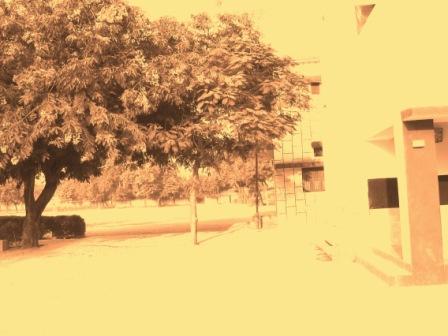My State These Days
[By Jigar Moradabadi. Translated from the Urdu by Siyaah]
My state these days turns heedless of pain-
Every joy that was my share seems on the wane... [1]
An apocalyptic glory indeed - this turns now to the beauty of both worlds-
The gathering is the same, yet the heart's desire is on the wane... [2]
The same companion and attendant, yet the heart does suffocate-
The lamp is the same, yet the flame is on the wane... [3]
This life is the same, O Jigar, yet such is my state-
As if the very life of life is on the wane... [4]
Translator's Notes
One of the critical aspects for this ghazal was re-creating the "kam hoti jaati hai" effect in English. In the original, this repeated rhyme applies to a variety of metaphors. After several considerations, the poetically familiar "on the wane" was chosen as it conveyed the literal meaning of "to decrease gradually in size, amount, intensity or degree" and could be applied to the derived meanings for the different metaphors in each couplet.
[1] tabiyat can literally mean disposition, nature, temperament but here 'my state' conveyed the closest meaning suggesting the temporal aspect related to 'these days'.
[2] qayamat kya... proved very difficult to translate. qayamat carries a variety of meanings, refering literally to 'the day of judgment' but often the derived meaning indicates something of comparable intensity, particularly beauty. The metaphor is cleverly used by the poet to convey that the gathering is intensely beautiful, an 'apocalypic glory' - the apocalyptic part leads to the idea of it being at the threshold of this world and the 'hereafter', thereby being 'the beauty of both worlds'. This also suggests that the 'gathering' refered to is the 'gathering' of all humans/the world, for which his heart does not have the same desire anymore...
[3] shaahid-o-saaqi literally means 'witness and cup-bearer', and implies 'companion and attendant' which seem to go better in English in the context of this couplet.
dil bujhta jaata translated as 'the heart does suffocate' conveys the literal imagery of getting extinguished but also the deeper sense of the metaphor implying a mental / emotional suffocation.
[4] The last line literally means 'life goes out of life' which is typical of Jigar's style - conveying a 'heavy' thought with startlingly simple lyrical beauty...I have captured the idea here by the rhyming ' the very life of life is on the wane'.
Subscribe to:
Post Comments (Atom)






7 comments:
Nice choice of words. A soulful translation indeed. The phrase chosen for "kam hoti jaati hai" is simply perfect!
I thought the 2nd couplet implied something different when I'd read the previous post. "Aye husn-e.." seemed to me to b an addressing only (and nothing else), while Qayaamat seemed to refer to the ironic change that the poet mentions in second line. (All this because of the one word-"aye"!)
aapne be-shak haq adaa kar diyaa...
brought a smile...:)
I like the last translated couplet :)
vik:
yes, it worked out better than i had originally expected. i can see how u might have thought differently about the 'aye'!
indscribe:
means a lot to hear u say that, esp with your knowledge of urdu.
phoenix:
mission accomplished, i'd say.
illusionist:
glad u do...last is where the life is...though the others were even more difficult to translate.
Lovely translation. You should blog more often.
Tap:
Thanks. Wish I could blog more often too...actually the content sometimes determines the frequency-as I translate, so I post...takes time!
Post a Comment